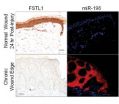(Press-News.org) Irvine, Calif., March 7, 2013 – Positive emotions are known to play a role in physical well-being, and stress is strongly linked to poor health, but is this strictly a "First World" phenomenon? In developing nations, is the fulfillment of basic needs more critical to health than how one feels? A UC Irvine researcher has found that emotions do affect health around the world and may, in fact, be more important to wellness in low-income countries.
The study, which appears online in Psychological Science, is the first to examine the emotion-health connection in a representative sample of 150,000 people in 142 countries. Previous research on the topic has been limited to industrialized nations.
"We wondered whether the fact that emotions make a difference in our health is simply because we have the luxury of letting them," said Sarah Pressman, assistant professor of psychology & social behavior and the study's lead author. "We wanted to assess the impact of emotions on health in places where people face famine, homelessness and serious safety concerns that might be more critical correlates of wellness."
Against expectations, researchers found that the link between positive emotions (enjoyment, love, happiness) and health is stronger in countries with a weaker gross domestic product. In fact, the association increased as GDP decreased, according to Pressman.
People in Malawi, which has a per capita GDP of $900, show a more robust connection between positive emotions and health than residents of the U.S., which has a per capita GDP of $49,800.
"A hostile American with hypertension can take blood pressure-lowering medication. A Malawian cannot," Pressman said. "Medical interventions might lower the impact of emotions on health."
Using data from the Gallup World Poll, researchers noted whether participants had reported experiencing enjoyment, love, happiness, worry, sadness, stress, boredom, depression or anger during the previous day. They also measured physical health and the degree to which subjects' basic needs were met. Security was assessed by asking if participants felt safe walking alone at night or whether they had been robbed, assaulted or mugged.
"We hope that by showing that this phenomenon is prevalent and stronger than some factors considered critical to wellness, more attention will be drawn to the importance of studying both positive and negative emotions," Pressman said.
She co-authored the study with Shane Lopez of the Gallup Organization and Matthew Gallagher of Boston University.
###
About the University of California, Irvine: Founded in 1965, UCI is a top-ranked university dedicated to research, scholarship and community service. Led by Chancellor Michael Drake since 2005, UCI is among the most dynamic campuses in the University of California system, with more than 28,000 undergraduate and graduate students, 1,100 faculty and 9,400 staff. Orange County's second-largest employer, UCI contributes an annual economic impact of $4.3 billion. For more UCI news, visit news.uci.edu.
News Radio: UCI maintains on campus an ISDN line for conducting interviews with its faculty and experts. Use of this line is available for a fee to radio news programs/stations that wish to interview UCI faculty and experts. Use of the ISDN line is subject to availability and approval by the university.
Contact:
Laura Rico
949-824-9055
lrico@uci.edu
UCI maintains an online directory of faculty available as experts to the media. To access, visit http://www.today.uci.edu/experts.
http://news.uci.edu/press-releases/emotion-health-connection-not-limited-to-industrialized-nations/
Emotion-health connection not limited to industrialized nations
In fact, UC Irvine study finds phenomenon more marked in developing countries
2013-03-08
ELSE PRESS RELEASES FROM THIS DATE:
Full wired: Planar cell polarity genes guide gut neurons
2013-03-08
The enteric nervous system (ENS), the "little brain" that resides within the gut wall, governs motility, secretion, and blood flow in the human gastrointestinal tract. Failure of the ENS to develop normally leads to congenital megacolon (Hirschsprung Disease) while loss of normal gut innervation is thought to contribute to debilitating motility disorders, such as irritable bowel syndrome. In order to prevent and treat these conditions, it is necessary to understand the molecular mechanisms that control the formation and function of the ENS. In this issue of the Journal ...
Enhanced brain acetate metabolism may reward heavy drinkers
2013-03-08
In addition to its well-known effects on the CNS, alcohol consumption has a significant impact on metabolism. After consumption, the body rapidly begins converting ethanol to acetate, which can serve as an energy source for the brain and other organs. Lihong Jiang and colleagues at Yale University used a brain imaging technique, magnetic resonance spectroscopy, to track acetate uptake and metabolism in the brains of heavy drinkers (consumed at least 8 drinks/week) and light drinkers (consumed less than 2 drinks/week). In this issue of the Journal of Clinical Investigation, ...
JCI early table of contents for March 8, 2013
2013-03-08
Enhanced brain acetate metabolism may reward heavy drinkers
In addition to its well-known effects on the CNS, alcohol consumption has a significant impact on metabolism. After consumption, the body rapidly begins converting ethanol to acetate, which can serve as an energy source for the brain and other organs. Lihong Jiang and colleagues at Yale University used a brain imaging technique, magnetic resonance spectroscopy, to track acetate uptake and metabolism in the brains of heavy drinkers (consumed at least 8 drinks/week) and light drinkers (consumed less than 2 drinks/week). ...
Genetic study of house dust mites demonstrates reversible evolution
2013-03-08
ANN ARBOR—In evolutionary biology, there is a deeply rooted supposition that you can't go home again: Once an organism has evolved specialized traits, it can't return to the lifestyle of its ancestors.
There's even a name for this pervasive idea. Dollo's law states that evolution is unidirectional and irreversible. But this "law" is not universally accepted and is the topic of heated debate among biologists.
Now a research team led by two University of Michigan biologists has used a large-scale genetic study of the lowly house dust mite to uncover an example of reversible ...
New fish species described from the streams of Manyas Lake basin, Turkey
2013-03-08
The newly described species Alburnoides manyasensis, belongs the large carp family Cyprinidae that includes freshwater fishes such as he carps, the minnows, and their relatives. This is the largest fish family, and more notably the largest family of vertebrate animals, with the remarkable numbers of over 2,400 species. Cyprinids are highly important food fish because they make the largest part of biomass in most water types except for fast-flowing rivers.
The genus Alburnoides is widely distributed in Turkey in rivers and streams of basins of the Marmara, Black and ...
Mom's sensitivity helps language development in children with hearing loss
2013-03-08
CORAL GABLES, FL (March 8, 2013) -- University of Miami (UM) Psychologist Alexandra L. Quittner leads one of the largest, most nationally representative studies of the effects of parenting on very young, deaf children who have received cochlear implants. The findings indicate that mothers who are most sensitive in their interactions with their children receiving cochlear implants have kids that develop language faster, almost "catching up" to their hearing peers. The report is published in the Journal of Pediatrics.
"I was surprised that maternal sensitivity had such ...
BRAF inhibitor treatment causes melanoma cells to shift how they produce energy
2013-03-08
A multi-institutional study has revealed that BRAF-positive metastatic malignant melanomas develop resistance to treatment with drugs targeting the BRAF/MEK growth pathway through a major change in metabolism. The findings, which will be published in Cancer Cell and have been released online, suggest a strategy to improve the effectiveness of currently available targeted therapies.
"We were surprised to find that melanoma cells treated with the BRAF inhibitor vemurafenib dramatically change the way they produce energy to stay alive," says David E. Fisher, MD, PhD, chief ...
A*STAR scientists discover 'switch' critical to wound healing
2013-03-08
Patients with diseases such as diabetes suffer from painful wounds that take a long time to heal making them more susceptible to infections that could even lead to amputations. A*STAR's discovery paves the way for therapeutics to improve healing of such chronic wounds, which are a significant burden to patients.
1. Scientists from A*STAR's Institute of Medical Biology (IMB) have identified a molecular "switch" that controls the migration of skin cells necessary for wounds to close and heal. This is especially significant for diabetics and other patients who suffer from ...
Stanford scientists calculate the carbon footprint of grid-scale battery technologies
2013-03-08
Americans take electrical power for granted whenever they flip on a light switch. But the growing use of solar and wind power in the United States makes the on-demand delivery of electricity more challenging.
A key problem is that the U.S. electrical grid has virtually no storage capacity, so grid operators can't stockpile surplus clean energy and deliver it at night, or when the wind isn't blowing.
To provide more flexibility in managing the grid, researchers have begun developing new batteries and other large-scale storage devices. But the fossil fuel required to ...
Home toxic home
2013-03-08
EAST LANSING, Mich. — Most organisms would die in the volcanic sulfur pools of Yellowstone and Mount Etna. Robust simple algae call it home, and their secrets to survival could advance human medicine and bioremediation.
Mike Garavito, Michigan State University professor of biochemistry and molecular biology was part of a research team that revealed how primitive red algae use horizontal gene transfer, in essence stealing useful genes from other organisms to evolve and thrive in harsh environments.
Their study, published in the current issue of Science, shows that the ...
LAST 30 PRESS RELEASES:
COVID-19 vaccination during pregnancy may help prevent preeclampsia
Menopausal hormone therapy not linked to increased risk of death
Chronic shortage of family doctors in England, reveals BMJ analysis
Booster jabs reduce the risks of COVID-19 deaths, study finds
Screening increases survival rate for stage IV breast cancer by 60%
ACC announces inaugural fellow for the Thad and Gerry Waites Rural Cardiovascular Research Fellowship
University of Oklahoma researchers develop durable hybrid materials for faster radiation detection
Medicaid disenrollment spikes at age 19, study finds
Turning agricultural waste into advanced materials: Review highlights how torrefaction could power a sustainable carbon future
New study warns emerging pollutants in livestock and aquaculture waste may threaten ecosystems and public health
Integrated rice–aquatic farming systems may hold the key to smarter nitrogen use and lower agricultural emissions
Hope for global banana farming in genetic discovery
Mirror image pheromones help beetles swipe right
Prenatal lead exposure related to worse cognitive function in adults
Research alert: Understanding substance use across the full spectrum of sexual identity
Pekingese, Shih Tzu and Staffordshire Bull Terrier among twelve dog breeds at risk of serious breathing condition
Selected dog breeds with most breathing trouble identified in new study
Interplay of class and gender may influence social judgments differently between cultures
Pollen counts can be predicted by machine learning models using meteorological data with more than 80% accuracy even a week ahead, for both grass and birch tree pollen, which could be key in effective
Rewriting our understanding of early hominin dispersal to Eurasia
Rising simultaneous wildfire risk compromises international firefighting efforts
Honey bee "dance floors" can be accurately located with a new method, mapping where in the hive forager bees perform waggle dances to signal the location of pollen and nectar for their nestmates
Exercise and nutritional drinks can reduce the need for care in dementia
Michelson Medical Research Foundation awards $750,000 to rising immunology leaders
SfN announces Early Career Policy Ambassadors Class of 2026
Spiritual practices strongly associated with reduced risk for hazardous alcohol and drug use
Novel vaccine protects against C. diff disease and recurrence
An “electrical” circadian clock balances growth between shoots and roots
Largest study of rare skin cancer in Mexican patients shows its more complex than previously thought
Colonists dredged away Sydney’s natural oyster reefs. Now science knows how best to restore them.
[Press-News.org] Emotion-health connection not limited to industrialized nationsIn fact, UC Irvine study finds phenomenon more marked in developing countries



